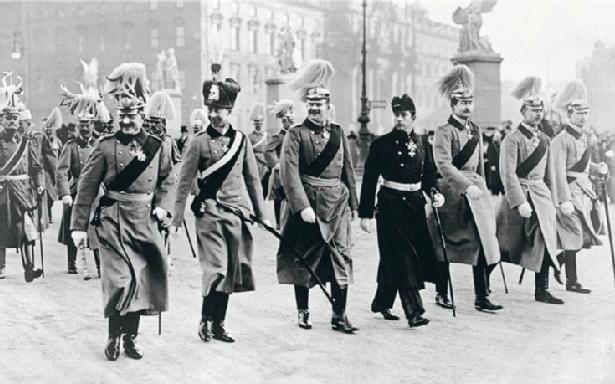Week 3 - Society and Culture in Wilhelmine Germany

Seminar Questions:
- Was Wilhelmine Germany politically 'backward'? How did it compare with other nations in this period?
- How did German society change between 1890 and 1914? What tensions did this produce and how did people respond?
Reading List:
Required Reading:
- Helmut Walser Smith, 'Authoritarian State, Dynamic Society, Failed Imperialist Power, 1878–1914' in Helmut Walser Smith (ed.), The Oxford Handbook of Modern German History (OUP, 2012)
- Matthew Jeffries,'Lebensreform: A Middle-Class Antidote to Wilhelminism?' in Geoff Eley and James Retallack (eds.), Wilhelminism and its legacies : German modernities, Imperialism, and the meanings of reform, 1890-1930 : essays for Hartmut Pogge von Strandmann (Berghahn, 2003)
Primary Sources:
-
Ludwig Quidde, Caligula: A Study in Roman Imperial Insanity (1894)
Further Reading:
- Katharine A. Lerman, 'Wilhelmine Germany' in Mary Fulbrook (ed.) German History Since 1800 (Arnold, 1997)
- Martin Kitchen, A History of Modern Germany: 1800 to the Present (2012), Chapter 9
- Mark Hewitson, 'Wilhelmine Germany' in J. Retallack (ed.), Imperial Germany 1871-1918 (OUP, 2008), pp. 40-60
- James Retallack, Germany in the Age of Kaiser Wilhelm II (Macmillan, 1996)
- James Retallack, Germany's Second Reich: Portraits and Pathways (2015)
Wilhelm II
- Christopher Clark, Kaiser Wilhelm II: A Life in Power (2009)
- Isabel Hull, The Entourage of Kaiser Wilhelm II: 1888-1918 (Cambridge, 1982)
- Thomas Kohut, Wilhelm II and the Germans: A Study in Leadership (OUP, 1991)
- Annika Mombauer & Wilhelm Deist (eds.), The Kaiser: New Research on Wilhelm II's Role in Imperial Germany (Cambridge, 2010).
- John Rohl, The Kaiser and His Court: Wilhelm II and the Government of Germany (Cambridge UP, 1994)
- ________, Wilhelm II: A Concise Life (Cambridge UP, 2014)
- ________, Wilhelm II: The Kaiser's Personal Monarchy, 1888-1900 (Cambridge UP, 2004)
- ________, Wilhelm II: Into the Abyss of War and Exile, 1900-1940 (Cambridge UP, 2014)
Wilhelmine Politics:
- Margaret L. Anderson, Practicing Democracy: Elections and Political Culture in Imperial Germany (Princeton UP, 2000).
- Larry Eugene Jones and James Retallack (eds.), Elections, Mass Politics and Social Change in Modern Germany: New Perspectives (Cambridge, 2013)
- Eric Brose, The Kaiser's Army: The Politics of Military Technology in Germany During the Machine Age, 1870-1918 (OUP, 2001)
- M.S. Coetzee, The German Army League (1990).
- Norman Domeier; Deborah Lucas Schneider, The Eulenburg Affair: a cultural history of the politics of the German empire (Camden House, 2015)
- Geoff Eley, 'Defining Social Imperialism: Use and Abuse of an Idea', Social History, Vol. 1, No. 3 (1976), pp. 265-90.
- Geoff Eley, 'Making a Place in the Nation: Meanings of "Citizenship" in Wilhelmine Germany' in Geoff Eley and James Retallack (eds.), Wilhelminism and its legacies : German modernities, Imperialism, and the meanings of reform, 1890-1930 : essays for Hartmut Pogge von Strandmann (Beghahn, 2003)
- U. Frevert, A Nation in Barracks: Modern Germany, Military Conscription and Civil Society (2004).
- D. Schoenbaum, Zabern 1913. Consensus Politics in Imperial Germany (1982).
- Stefan Manz, "Nationalism Gone Global: The Hauptverband Deutscher Flottenvereine im Auslande, 1898-1918", German History, Vol. 30, No. 2 (2012), pp. 199-221.
- Matthew Jeffries, Contesting the German Empire, 1871-1918 (Oxford, 2008), Chapter 4
- Treiblmayr, 'Militarism Revisited: Masculinity and Conscription in Germany', Journal of Contemporary History, Vol. 39, No. 4 (2004), pp. 649-56.
Society and Culture:
- Annemarie Sammartino, 'Alternative Modernities: Imperial Germany through the Lens of Russia' in Geoff Eley, Jennifer Jenkins; Tracie Matysik (eds.), German Modernities from Wilhelm to Weimar (Bloomsbury, 2016)
- Celia Applegate, 'Culture and the Arts' in James Retallack (ed.), Imperial Germany 1871-1918 (OUP, 2008), especially pp. 120-6
- Celia Applegate, The Necessity of Music: Variations on a German Theme (Toronto: University of Toronto Press, 2017)
- Celia Applegate, A Nation of Provincials: The German Idea of Heimat (Berkeley, 1990)
- Paret, Peter & Beth Irwin Lewis, ‘Art, Society and Politics in Wilhelmine Germany’, Journal of Modern History, No. 57 (1985), pp. 696-710.
- Eve Rosenhaft and Robbie Aitken, Black Germany: The Making and Unmaking of a Diaspora Community, 1884-1960 (Cambridge, 2013)
- Marsha Morton, Max Klinger and Wilhelmine Culture: On the Threashold of German Modernism (Ashgate, 2014)
- Angelika Schaser, 'Gendered Germany' in James Retallack (ed.), Imperial Germany 1871-1918 (OUP, 2008), pp. 128-150.
- Edward Ross Dickinson, Sex, Freedom, and Power in Imperial Germany, 1880–1914 (Cambridge University Press, 2013)
- Lisa Featheringill Zwicker, Dueling Students: Conflict, Masculinity and Politics in German Universities, 1890-1914 (University of Michigan Press, 2011)
- Ann Taylor Allen, Satire and society in Wilhelmine Germany : Kladderadatsch and Simplicissimus, 1890-1914 (University Press of Kentucky, 1984)
- Peter Fritzsche, Reading Berlin 1900 (Harvard University Press, 1996)
- Peter Paret, The Belin Secession: Modernism and its Enemies in Imperial Germany (Harvard, 2014)
- Lynn Abrams, 'Finding the Female Self: Women’s Autonomy, Marriage and Social Change in Nineteenth-Century Germany' in Jan Ruger; Nikolaus Wachsmann (eds.), Rewriting German History: New Perspectives on Modern Germany (Palgrave, 2016)
- Mischa Honeck; Martin Klimke; Anne Kuhlmann-Smirnov (eds.), Germany and the Black Diaspora: Points of Contact, 1250-1914 (Berghahn Books, 2016)
- Elena Mancini, Magnus Hirschfeld and the Quest for Sexual Freedom: A history of the first International Sexual Freedom Movement (Palgrave, 2010)
- Alan Bance, 'The Novel in Wilhelmine Germany' in Graham Bartram (ed.), The Cambridge companion to the modern German novel (Cambridge, 2004)
- Birgit Lang and Katie Sutton, 'The Queer Cases of Psychoanalysis: Rethinking the Scientific Study of Homosexuality, 1890s–1920s', German History (2016) 34 (3), pp. 419-444
- Till van Rahden, Jews and other Germans : civil society, religious diversity, and urban politics in Breslau, 1860-1925 (Madison, Wis. : University of Wisconsin Press, 2008).
